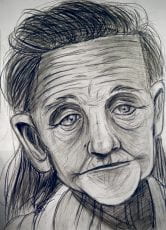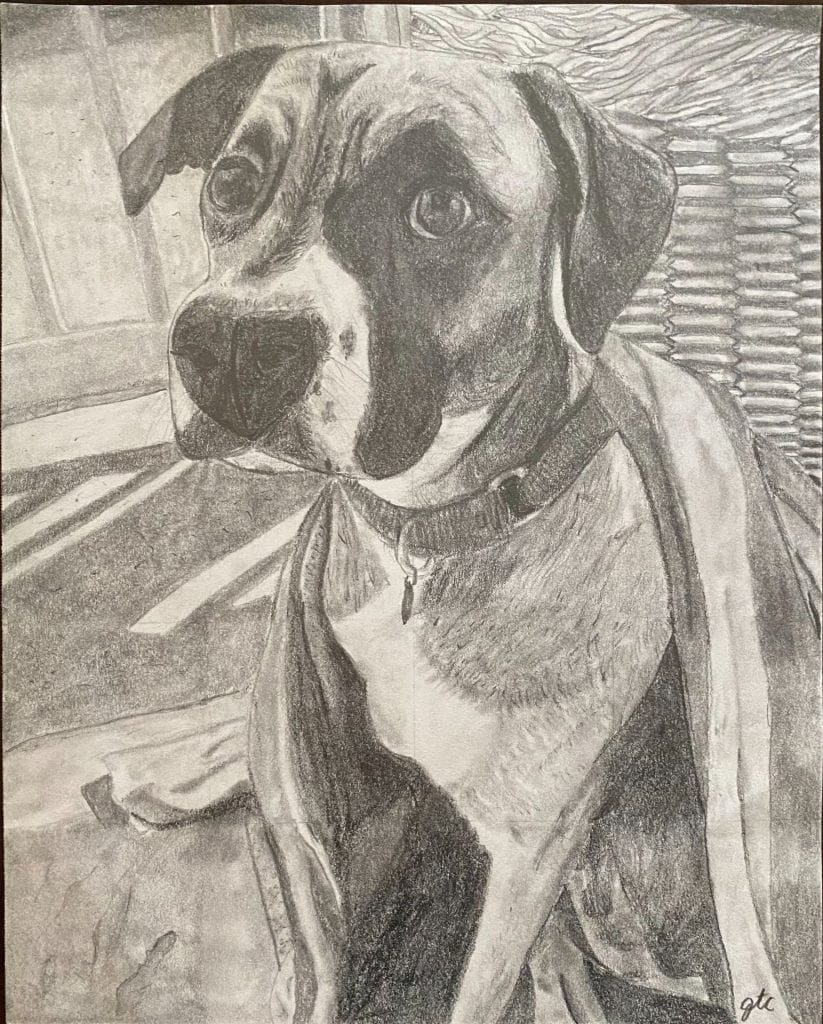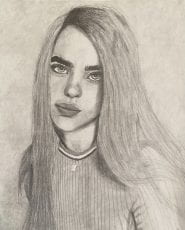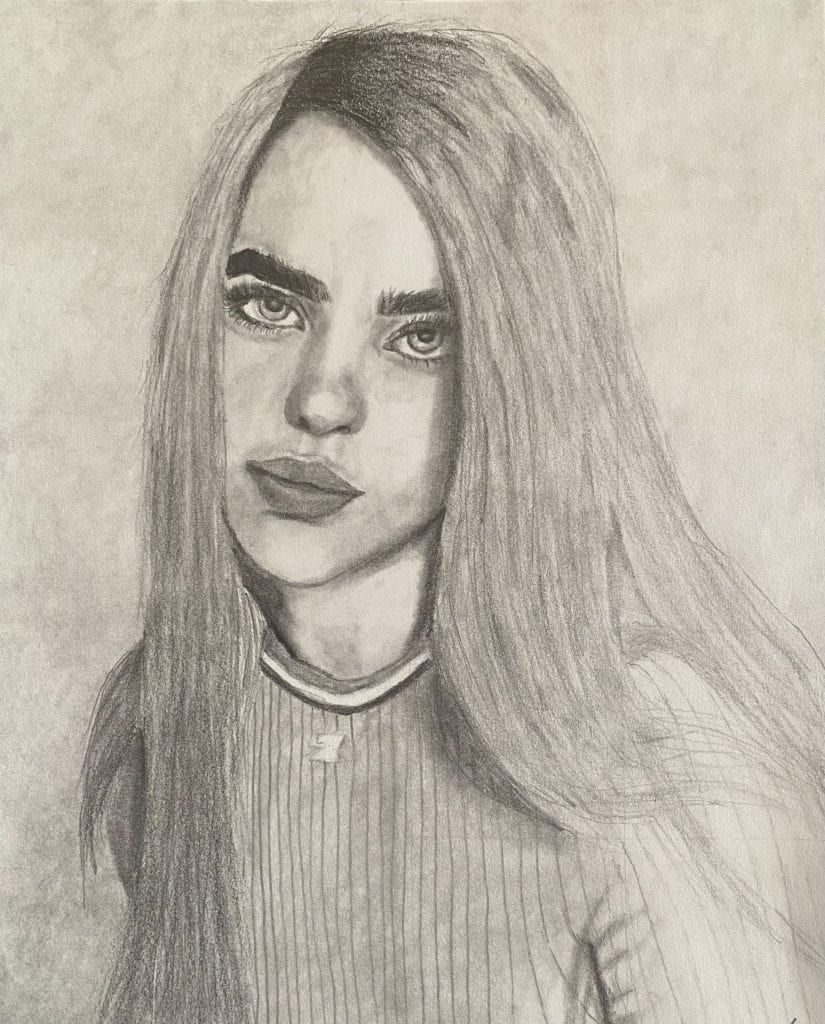Artwork: Plague Doctor by Kayla Spratt
Artwork: Paw Prints in the Sand by Jane Cassidy
“Rocky Beach” by Quinn Fensterwald
I remember that morning,
Even though I was young.
The graying streaks in her once blond hair,
My auntie and I took in the morning air,
And the taste of a salty breeze resting on my tongue.
“Watch your step,” she told me,
Pointed at the rocks.
Large ones, small ones,
They must weigh tons,
So we stepped with care, no shoes or socks.
An abundance of crabs scuttled along the sand,
And my auntie and I watched where we stepped,
Avoiding the chance of a claw to the foot,
And a sad look,
But we finally made it to where the water crept.
I watched as the tide came in and out,
As if the ocean was teasing the sand.
When I look back on the memory I made,
I close my eyes and wish that I could have stayed
At the beach where the rocks were too big to fit in my hand.
And my auntie, who always reminds me of who I am today.
I’ll draw the same beach, where the two of us would stand.
Artwork: Doggie in a Pool Towel by Jane Cassidy
“Lies” by Charlotte Edmonds
Faded memories of warm summer days on the beach:
Sunburns, burning sand between our toes, and ocean water chilling us to the bone;
Strolls with the goldens through the towering trees lining the path,
Shady and cool and birdsong from up above,
Huddled around the campfire at dusk,
Songs and stories and laughter and happiness;
Long rides on the boat,
Wind in our hair, ocean spray in our faces, jumping off into the water;
Picnics with ice cold lemonade on the beach,
Warm chocolate muffins in the morning,
Homemade recipes,
Burning marshmallows,
And fresh, juicy watermelon dripping down our chins.
Not a care in the world.
A whole island paradise just for us,
A place to escape each summer, a place to feel loved,
All viewed through false eyes:
Joyful summer memories lost and long gone, the love drained out years ago,
Replaced by false emotion.
The harsh reality of lies and greed and hatefulness concealed by rose-tinted glasses that hid the truth for so long,
Now up in flames.
The burning truth is raw and bare and reveals all that was covered,
Exposing the true colors that were there all along.
Artwork: Billie Eilish by Jane Cassidy
Artwork: Aging by Kayla Spratt


Medium: graphite and charcoal
Inspiration: I drew this piece as a way of saying that people should embrace their old age instead of denying it. Everyone is afraid to get old, covering up their wrinkles and silver hair. But nothing is ugly just because society says it is. I hope the viewer sees this as a promotion of self love, and body positivity.
What is War? by Gillian Deeb
War is known for being insatiable as is the cost of war. As it preys on society, people keep voraciously feeding into it. War has an unappeasable hunger. The blood must continue to flow up until one side surrenders. We live in a society that deems murder illegal. Doesn’t that mean every soldier to take a life is guilty of what’s punishable by death? The first innocent man to be executed is when the cost of war is far too high.
War is the outcome of poor negotiation and the inability to put personal vendettas aside and have peace over death. The act of war has been used far too often to even be considered a wild card. Society makes starting a war out to be a grown political party’s version of a temper tantrum. Moreover, the goal of war is to weaken the military potential of the enemy. In order to win the war one must make the other participant surrender by any means necessary. Society has stretched the word “any” to great lengths just so their actions are “justifiable.” Billions of women, men, and children have lost their lives due to said justifiable actions.
Those who choose to join the military understand that they will be trained to kill other human beings. War makes monsters out of men, turning them undoubtedly into killing machines. There are a large percentage of people who fought in long battles just to come out the other side knowing not one logical reason for the scars left behind. The bloodshed seamlessly leaves them blind and desensitized to the destruction surrounding them. The mental cost given to men and women fighting for their prospective countries should be unconstitutional. How far is society willing to go for issues solved with destruction and economic decline?
It is often thought that the cost of war is a necessary evil and an honorable one at that. Those same people also believe that some situations can’t be solved by a handshake. However, pacifists believe war is unjustifiable, and that countries or factions inside of one’s disagreements can be solved with peace. With that being said, war is red, blood soaked with cruel intentions, even if the men and women fighting do not harbor cruel ideals. The act of war makes honest men numb and irreparable.
War is barbaric with costs exceedingly high. I humbly ask those reading to not have spouses, children, family, and friends mourn the loss of more soldiers. Everybody is so devoted to the idea of peace, yet very few have stood up and taken measures to pursue it. To love thy neighbor and leave hatred behind is such a strong sentiment…Love. Not. Hate.
Clarity by Mal Little
Her bare feet pounded the ground with urgency. Vicious barks and shouts sounded off behind her, an orchestra of voices and boots reminding her of her demise. Tears clouded her vision as she tried to make sense of her surroundings. The woods were once her playground, a place of wonder and imagination. None of that mattered now, though, as they were only an inescapable labyrinth of looming giants and winding paths.
“Stop running!” A member of the vexed mob shouted.
Thorns, acorns, stones, insects, all greeted the soles of her feet with pain, but she did not notice. Prayers— the lord is my shepherd— green pastures— body, blood, witchcraft— Words planted in her mind since birth played over and over in sync with her troubled breaths.
“Clarity! Come and repent!” implored a voice, which she couldn’t quite place. She imagined it was her mother that was running after her, begging her to come home and pretend as if none of this had happened. But what had even happened? Pious as she was, Clarity knew her mother wouldn’t have her hanged. That didn’t stop her from running, though.
Faint wafts of smoke watered her eyes as she came upon a grassy clearing. Fire? She pondered, her mind still swirling in distress. The pummels of footsteps and dogs had scattered and lessened, easing her worries greatly. Darkness resumed around her as the mob’s torches moved further away, with the only light being the full moon against a starless sky. Taking a deep, shaky breath, Clarity pushed onward at a brisk walking pace.
She did not know where it was she was walking to, but the smoky smell seemed to guide her in some semblance of a direction. Through the tall halls of trees and thick fog, a faint glimmer of yellow light shone through what she perceived as windows. A house!
Clarity did not remember the lesson her mother once taught her of being meek and weary of strangers, as she immediately ran to the small outpost. In the faint light of the moon and windows, she could scarcely make out the features: aged, dark oak planks lined the outer walls, with crude splotches of mud cementing them in place. She didn’t dare peer through one of the windows: what if someone was there, looking right back at her?
Running her hand along the grooves of the wood, she felt around for a door to knock on.
At last, her hand landed on a rudimentary handle. Her instincts immediately told her to just open the door—she was exhausted and tired— but she then remembered that human decency existed. Moisture clung to her, making her hair stick to her face. Clarity realized how much of a mess she must seem. Composing herself and brushing various twigs and leaves from her person, she prepared to knock on the mysterious door.
Tap-tap-tap.
Her small, clammy fist made three meek knocks. This is my only choice. May God have mercy on my soul. She felt herself cower as thundering, beast-like footsteps of boots made their way towards the door. Pulling her arms around her torso, hugging herself, for some semblance of comfort, she took shaky breaths and squeezed her eyes shut. Perhaps I could become a squirrel for the night and rest in a tree?
A suave voice interrupted her shuddering, “How do you do?”
Clarity’s eyes shot open in either surprise or relief, as the voice she heard had not matched her mental painting of this man at all. His appearance, however, fit it perfectly: face like tanned leather, heavy woolen clothes, large, intimidating boots, and a scraggly, brown beard and mop of hair. Clarity could not place his expression, which filled her with unease. Looking at the hermit before her, she nevertheless nodded her head graciously for his kind question.
“I’m good this evening sir. I—I got lost on my way home from my Aunt Patience’s house and need lodging for the night. Would you do me this kindness?” She lied shyly, fumbling with the hem of her exposed stays. He let out a low rumble of thunderous yet quiet chuckling, which Clarity could not understand. “I apologize if I’ve offended you. I promise to leave by morning, I only want to wait till it’s light so I may find my way home.”
“Come in, child.”
The house in question was surprisingly neat and tidy, but it wasn’t home. As inviting as the stranger’s house at that moment felt, with his kitchen’s soft orange glow and various furs spread across the floors, she longed to be home with her family and without allegations of sin. The man did not lead her inside, but immediately walked to his kitchen to tend to a bubbling stew.
“Sit where you’d like, grab a pelt if you’d like. You must be frigid.” He ladled some of the viscous stew into a small bowl, which Clarity assumed was venison by the amount of deer pelts and antlers scattered around his house.
“Or stand if you’d like, doesn’t matter to me,” he grumbled. Clarity blinked. She didn’t realize she’d been staring. Immediately sitting down at his small dining table, she wrapped her arms around her torso.
“Thank you for your hospitality, sir,” she almost whispered. Clarity felt his eyes burning through her, but she avoided his gaze at all costs. She tried not to think about what her village would say if they knew what she’d done tonight: sleeping in a strange man’s house, after running
from the court? What was I thinking? Her name would surely be a curse on people’s tongues for centuries to come.
“Just being a good Samaritan.” He gently set the bowl down on the table with a small
clink.
Clarity finally decided that she couldn’t keep ignoring his prying stares. After taking a sip of the hearty stew, which she thought was surprisingly tasty, she looked up at him. The man stared inquisitively. Taking a few more shaky sips of soup, Clarity thought of an escape plan in case things went awry:
If I should run, the door is only about ten feet away. But where will I go once I escape? I cannot possibly go back to the village, as much as I’d like to. I wonder how far the next settlement is? Perhaps I should follow the rising sun once morning comes-
“Why did you run?” Clarity’s racing mind was interrupted by the soft, monotone voice in front of her. Her spoon clattered on the table with droplets of soup spilling over.
“Pardon?”
“Why did you run?” “I wasn’t running.”
“Yes you were,” he said, leaning back in his chair with an ever so slightly upturned smile. It wasn’t a cruel smile, but rather an amused one. Clarity could practically feel his stare piercing through her. He knows I lied.
“I wasn’t running.”
“You broke a sweat. Why would someone taking a nightly stroll break a sweat? It’s Autumn, not summer.” Clarity thought a moment before countering him.
“I was nervous. I thought I wouldn’t find my way home.”
He merely nodded his head, but she knew he wasn’t content with that answer.
“Why do you want to go home?” He asked. Clarity did not understand this question, or any of his questions for that matter. What a strange person. Nobody has ever asked me this many questions.
“What sort of question is that? It’s my home,” she spoke with irritation this time, “and I would like to be there right now.”
“Then walk home.” “It’s dark-”
“I’ll light the way.” He gestured to the lantern placed at the center of his table. He was right; the lantern lit the whole room, so surely it would be enough to light her way home.
Clarity chose to ignore this and feigned a yawn.
“I wouldn’t want to frighten my family in the middle of the night, could you show me where I’ll be sleeping?” she responded, in an attempt to change the subject.
As soon as she spoke, the lantern flickered. The ghastly light illuminated the man’s face intermittently, casting an ominous expression on his face. The shadows carved his face into something utterly wicked as he stared back into her. Lightning flashed outside, making Clarity jump in her seat.
Shivers ran down Clarity’s spine as the room became much dimmer. The lantern was now only an ember. Sheer fright also struck her as she realised the door was no longer visible; the room became the woods she was previously running through, a swirling labyrinth.
“Sir, you’re frightening me.” Clarity nearly whispered, her voice quivering.
He simply sighed. “Why are you frightened of me? We’re merely in a dark room. Are you more scared now than when you were running from your village?” His fingers tapped a steady rhythm on the table top as he awaited a response.
“How—” Clarity pushed her chair to stand and run, but something stopped her. It doesn’t matter how this man knows- she decided- I just need to convince him I’m innocent.
He let out a low, dark chuckle. “Have no fear. You are safe here.” The light was now completely out, “Safe from that crazy lot you call your village.” He spat the last word out. Even in the complete darkness, Clarity felt his sneer at the thought of her hometown. Anger boiled inside of her.
“We are a holy people. You should watch your tongue, sir.” She was sure she didn’t sound as confident as she tried to seem, being that she couldn’t see a thing in front of her. A creaking chair told her that the mysterious man was leaning forward.
“A holy people? Your village just chased you, a young, innocent girl, through a winding forest in the dead of the night. They want to hang you for witchcraft as well, I presume, and you call them holy?” Clarity said nothing. The man’s chair creaked again as he leaned back into it, disappointment shrouding him, no doubt.
“They found me guilty,” was all she said after a period of time, “they said I was a
witch.”
“And are you?”
Clarity said nothing again. A lump formed in her throat as she tried to think of an answer. All her life she’d been told the good word.
“It’s not up for me to decide.”
The man laughed again. Stop laughing. Please. Clarity felt increasingly distressed at every sound. Rap, rap, rap, rap. His fingers kept tapping the same, constant rhythm.
“So the court decides? The blasted, ignorant, village court? They decide that a young girl is a witch?”
“Yes.” Rain danced on the rooftop as their “conversation” continued.
“So you agree they’re ignorant?” Another flash of lightning unveiled the man’s smile, making Clarity’s blood curdle even more than it had been.
“No! I didn’t mean it like that,” she folded her arms as she felt tears stinging her eyes, “your words tricked me.”
“Your village tricked you, not me.”
“How can you say such things? You’re wrong!” Clarity could not believe her ears. She so badly wanted to leave, but she couldn’t move an inch of her body. Her heart yearned to be home with her mother and father, but she couldn’t bring herself to run. She shivered.
“You do not know right from wrong. You were told from when you were first born to listen and do nothing more than that. You’re incapable of thinking for yourself, Clarity” He leaned forward so that Clarity could scarcely make out his features; he had a faint look of compassion on his face, surprising her. He did not seem like the rugged man she met at his doorstep. “Why is it that you’re defending a village that wants you dead?”
Clarity had had enough. The man’s question defeated her, sending her into a manic sob on the table.
“I don’t know!” She bawled into her arms on the tabletop. “I don’t know, I don’t know, I don’t know…” She muttered between choked sobs. The man said nothing at her sudden outburst, but she felt the tip of his boot graze her own foot. This sudden act of compassion settled her sobs momentarily, and she gazed up at him.
All her life, Clarity listened. She listened to every sermon, every scold, every trial, every confession. She could recite any and all verses of the holy book. Why would they do this to me? Her cries came to a quiet stop as she tried to make out his face against the sporadic flashes of lightning.
Silence. Neither of them spoke as Clarity assumed the man was letting her think on her revelation.
“Even the oldest, wisest lemming will follow the others off a cliff,” he said, breaking the silence, “even if it knows it’s demise will surely follow.” The rain was coming to a quiet stop as Clarity listened intently.
“You’re not that lemming. You ran from the cliff, but you still love the herd.” He reached for her trembling hand, which sent a shockwave through her. Nevertheless, she let herself grasp it.
Fewer thoughts were racing through her mind as her internal storm ended in tandem with the one outside. One, however, nagged at her more than anything else,
“How do you know my name?” She kept her grasp on his hand steady.
“I know many things.” She gazed into his eyes as he spoke, as she could now see the softest glow emanating from them; this didn’t frighten her, though, as nothing could at this point. “I know that you will not leave in the morning.”
Clarity felt herself become drowsy, her head nodding every so often into unconsciousness.
“I think you would be correct about that, sir.”

 Medium: charcoal
Medium: charcoal
 Medium: photography
Medium: photography


